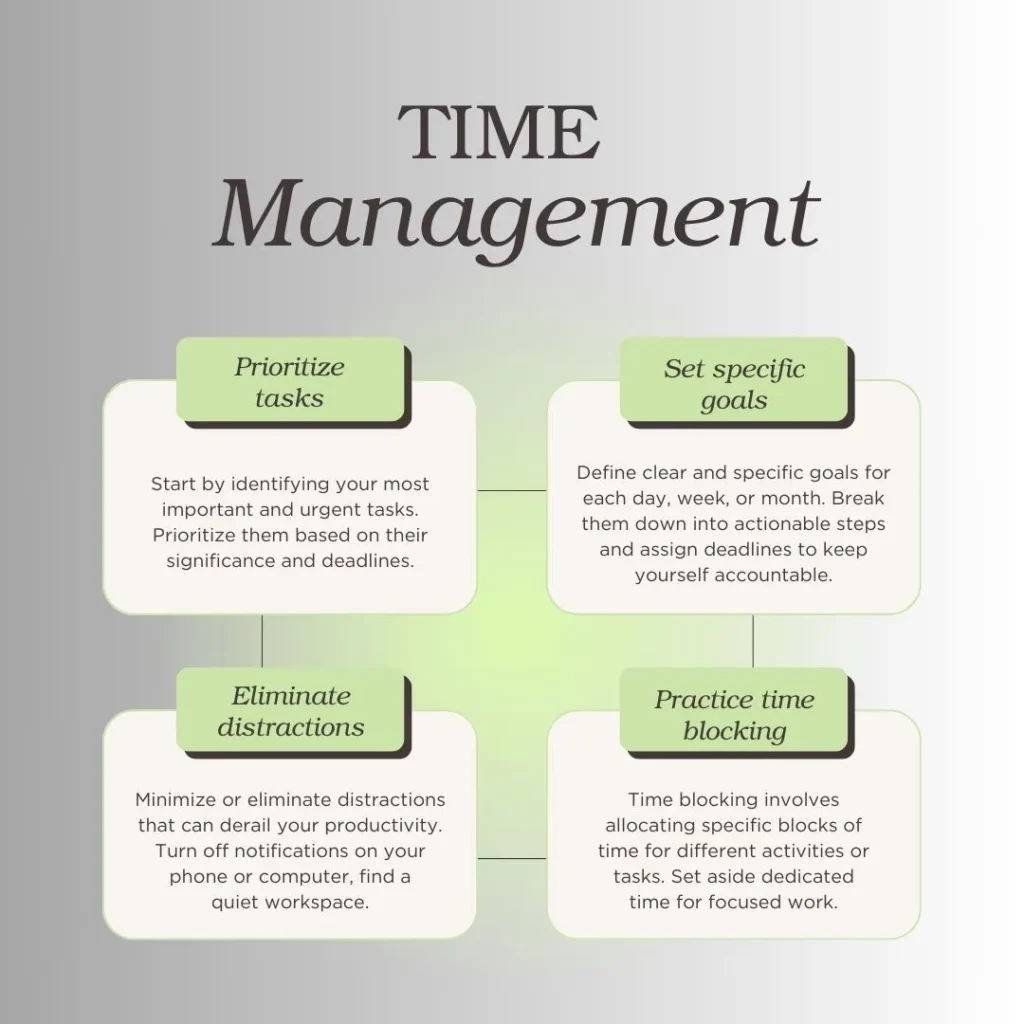Take the time to manage your time.
“Give me six hours to chop down a tree and I will spend the first four sharpening the axe.”
-Abraham Lincoln
This guide contains everything you need to know about time management for teens.
How to start?
How to create a manageable schedule?
How to create an effective action plan?
With the help of simple strategies and realistic examples, everything is explained step by step.
Let’s get started. With that, here are the steps to time management for teens:
Use your time well:

Life is too short. Everyone has 24 hours in a day. If someone is 24 years old and sleeps eight hours a day, he has spent eight full years just sleeping.
So one third of your life will be spent sleeping.
You have many things to do in the rest of your life, such as;
- Chasing your dreams
- Studies and extracurricular activities
- Engaging in physical activities
- Time with family and friends
- Hobbies and interests
- Reading books
- Journaling
- And listening to music.
Do you think you can do all this in the time left, without proper time management? Whereas you have already dedicated one third of your life to sleep.
The answer is: No! Absolutely not.
You have to manage your time, keeping everything under regular planning.
That’s why we’re here to let you know the best strategies of “time management for teens”
Time management for teens: 8 practical steps to follow
Let’s begin the step-by-step guide to mastering time management skills for teenagers and students.
1. Make a list of priorities
The very first step is:
Make a to-do list and prioritize the tasks that need to be done right away.
There can be three types of tasks:
- Unimportant tasks: watching TV, playing games, etc.
- Important tasks: school, work, extracurricular activities, and time for yourself, family, and friends.
- Urgent tasks: completing homework, assignments, studying for tests, etc.
Remember! You will naturally tend to give more time to unimportant tasks. That’s why you will have less time for important tasks. And thus they will turn into urgent tasks.
Keep in mind
“Urgent tasks cause stress.”
So, put urgent tasks at the top of your priority list, followed by important tasks, and then unimportant tasks at the end.
Related article: 11 Exciting Leadership Activities for Teens
Now move on to the next step
2: Say no to some things
Things that fall into the unimportant category.
Saying no can help free up time to focus on the things that matter the most.
Are you ready to say no to the following things for time management?
1. Extra work that isn’t necessary: If it’s something that won’t add value to your life or work, it’s better to say no.
2. Unnecessary meetings: If the meeting doesn’t have a clear purpose or agenda, don’t agree to attend.
3. Social events that don’t bring you joy: While it’s important to have a social life, it’s okay to decline invitations to events that don’t give you a sense of fulfillment or joy.
4. Too many commitments: Saying yes to everything will only lead to burnout. Take the time to evaluate each request and decide what is truly necessary.
This will enable you to free up more time for important tasks and avoid the urgency scenario.
By now you have prioritized your to-do list, and you’ve got enough time, so let’s move on to the next step.
3. Set realistic goals
Allocate an appropriate timeline to every task on your to-do list.
- How much time do I need to complete my homework?
- How much time do I devote to my physical activities, like Games?
- How much time do I need for entertainment and social media?
Set both short and long term goals, and break large goals into small, manageable goals.
For example, If you have a three chapter test six days later, you should read half a chapter daily.
What is the difference between the life of an ordinary person and that of an extraordinarily successful person?
Let me tell you what all successful people do:
- They find their passion
- They set real goals
- They set action plans
- Then they develop the habit to stick to their goals
Once you develop these qualities, you will be successful too.
Realizing the value of your time, you’ve developed your priority list, organized it, and set your goals accordingly, so now we will move on to our next step.
Related article: Goal Setting for Teens: A Complete Blueprint for Success
4. Get organized
Humans are naturally inclined toward ease. Because of this natural phenomenon, you prefer driving to walking, even for short distances. You prefer the elevator to the stairs. Even you immediately pull out a dictionary for small spellings, and a calculator for a small calculation.
In a sense, of course, these things keep you from burning out, fed up, and getting exhausted.
So, arrange your environment according to your goals. Your surroundings should be supportive of your important activities.
This may involve;
- Keep only essentials, files, books, and pens on your table
- Keep anything (i.e. water bottle) you may need at work within your reach so that you don’t have to get up during work
- Keep everything beautifully organized according to your priority list
And yes, external distractions also have a profound effect on the supporting environment. For example, reduce noise, put your mobile away, and mute all unnecessary notifications. If you make your environment compatible with your work, it will naturally support you in what you are doing.
Our next step is:
5. Remain focused on the task at hand
You are studying for a test.
You will certainly perform well in the test only if you stay focused on the material and do not get sidetracked by next episode of your favourite drama serial.
This means avoiding distractions such as TV, phones, social media, or other activities.
When studying, it is important to:
- Plan what amount of effort is required
- Plan for the material you need to cover
- Prepare a timetable (with start and end points)
Make sure to:
- Break up studying into manageable chunks
- Small breaks are necessary to stay focused
- Create a study-supportive environment
- Having a clean desk and good lighting will make studying more enjoyable
Hence, you can stay focused on the task at hand and successfully prepare for your test.
By now, you have mastered the skill of focus.
So let’s move on to the next step.
6. Avoid distractions
Have you ever heard of Pomodoro Technique before? What a best technique to pave the way to achieving your goals? Let’s go into the details
As a college student, I myself have benefited by using it.
To use this technique, you divide your time into 25-minute and 5-minute intervals, in which you concentrate on work for 25 minutes and take a five-minute break. Then the next 25 minutes of focused work and a five minute break, and so the cycle repeats.
This technique has helped me a lot in staying focused and concentrated. Because in our modern world, there are countless ways to be distracted.
Before applying Pomodoro Technique,
Do five things to avoid distractions:
- Plan out tasks and schedule them
- Inform your family and friends of your special work or study hours
- Avoid social media scrolling
- Put all electronic devices in another room
- Turn off notifications
There are many ways to manage distractions and not every method suits everyone. So, it’s up to you to figure out which method is best for you and then apply that method. Learn to make the best use of time to achieve your goals.
Related article: 13 Exciting Teenage Confidence Building Activities
7. Don’t Procrastinate
Do you know?
Increased levels of tension and anxiety are a result of procrastination.
The reason for this is that “The longer you postponed a task, the more of a burden it becomes on your head.”
Remember! Procrastination can have serious consequences.
It can cause you to miss important deadlines, resulting in punishment or a lower grade.
On the other hand,
By avoiding Procrastination:
- You can do tasks more swiftly and effectively
- You can have more free time to do other things
- You can reduce your stress level
- You will have more control over when you finish projects
8. Reward yourself
Reward is an effective motivator. Every time you reward yourself on any accoumplishment, you sow encouragement within your unconciousness.
Rewarding includes anything from:
- Getting a snack from your favorite cafe
- Taking a short break to watch TV
- Buying a small item you have been wanting
Rewarding does not mean to be something expensive. It just needs to be something that makes you feel proud of the achievement and fuels you up for the next destination.
By rewarding yourself, you are more likely to stay on track with your goals and be more successful in the long run.
Related article: Social skills for teens: A set of 5 strong skills
Takeaway: You can manage your time effectively if you put in some effort.
If you do something, it will be done and if you do something well, it will be done well. But remember! To do it well, you have to put in some extra effort. This extra effort, in return, will multiply your reward.
To be able to manage your time effectively as a teenager, be ready to put in some effort.
As you embark upon your journey of life, the skill of time management will help you make the most of every moment.
Every moment is an oppertunity. Moments together make life. Every moment has its role in determining the direction of life. Live every moment to your heart’s content.
We wish you the best of luck in your life ahead and hope that you continue to utilize the time management skills you have acquired to make the most of your life.
Congratulations on mastering this skill and best wishes for the life ahead!
References:
- Alyami, A., Abdulwahed, A., Azhar, A., Binsaddik, A., & Bafaraj, S. M. (2021). Impact of Time-Management on the student’s Academic Performance: A Cross-Sectional Study. Creative Education, 12(03), 471–485. https://doi.org/10.4236/ce.2021.123033
- Razali, S. N. a. M., Rusiman, M. S., Gan, W. S., & Arbin, N. (2018). The impact of time management on students’ academic achievement. Journal of Physics, 995, 012042. https://doi.org/10.1088/1742-6596/995/1/012042
- Youth activity: Manage your time for well-being. (n.d.). UMN Extension. https://extension.umn.edu/youth-learning-and-skills/daily-time-management-wellbeing
- Arumugam, A., Shanmugavelu, D., Yusof, D. H. B., Hamid, D. B., Manickam, D., Ilias, D., & Singh, J. S. A. (2021d). THE IMPORTANCE OF TIME MANAGEMENT FOR THE SUCCESSFUL OF TEENAGERS’ IN EDUCATION: AN OVERVIEW. EPRA International Journal of Multidisciplinary Research, 330–339. https://doi.org/10.36713/epra8291

8 thoughts on “A Guide to Time Management for Teens:(8 practical steps)”
Comments are closed.